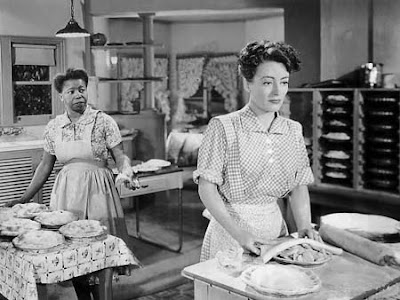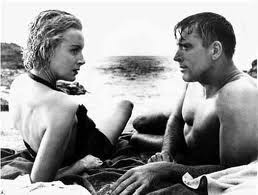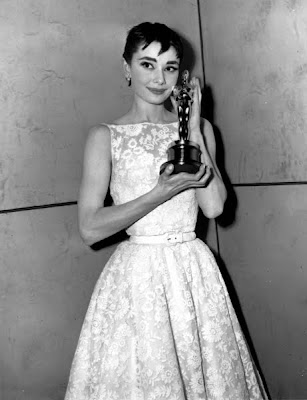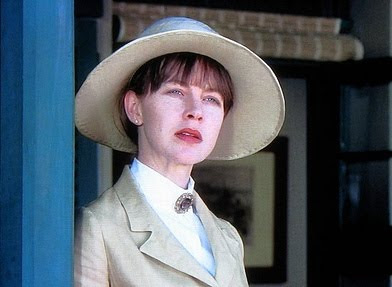Finally, our final chapter of "Epic Fails: Woman Who Were Robbed of Oscar" is here. Our two previous chapters focused on Oscar years in which the Academy almost got it right. In other words, some Best Actress winners over the years deserved to win, but they beat other women in those years who also deserved to win. But today, we get to the nitty gritty, the Oscar years in which women took the Oscar who never should have won. These women have an Oscar on their mantles for all the wrong reasons, none of which have anything to do with turning in a great performance. The hapless, but very, very lucky ten are Joan Fontaine, Joan Crawford, Loretta Young, Jane Wyman, Audrey Hepburn, Elizabeth Taylor, Julie Andrews, Sally Field, Gwyneth Paltrow and Sandra Bullock.
.
 (cary grant and joan fontaine in "suspicion"... cary seems to be sharing our thoughts, "you won an oscar for this movie? really?")
(cary grant and joan fontaine in "suspicion"... cary seems to be sharing our thoughts, "you won an oscar for this movie? really?")
.
In 1941 Joan Fontaine won for Alfred Hitchcock's "Suspicion" and created the template for the "victim character" which would be become the staple of every Lifetime women's movie a half century later. Fontaine suspects that her husband, Cary Grant, is plotting to murder her, but despite fearing for her life, there's never a moment in which Fontaine shows any emotional range, much less does she simply buy a gun to pop a cap in her husband's ass. Fontaine is ninety minutes of irritating "scared mouse", and by the end of the movie, not only do you hate Fontaine, but you find yourself really wishing Cary had, indeed, pushed her out of the car on the edge of that cliff. Now, when considering the fact that Fontaine beat Bette Davis in "The Little Foxes" in which Davis created one of the most evil, cold-hearted bitches in movie history, Fontaine's win seems even more implausible. There is no way that Fontaine in "Suspicion" deserved an Oscar.
BACKSTORY: Fontaine's win was probably a "make-up" win for her loss the previous year in a much better movie and role in Hitchcock's "Rebecca". Also, Bette Davis already had two Oscars by 1941, so the Academy probably felt as though she had been rewarded enough.
.BACKSTORY: Fontaine's win was probably a "make-up" win for her loss the previous year in a much better movie and role in Hitchcock's "Rebecca". Also, Bette Davis already had two Oscars by 1941, so the Academy probably felt as though she had been rewarded enough.
 (joan crawford as the iconic "mildred pierce")
(joan crawford as the iconic "mildred pierce")Joan Crawford took her one and only Oscar in 1945 for "Mildred Pierce", although her performance is hammy, overly wrought and at times, downright campy. The problem that year is that no other actress turned in a performance much worth noting. It was one of the weakest years in all of Oscar history for women's performances, so Crawford had little competition. If we had been around that year, we probably would have voted for Gene Tierney in "Leave Her to Heaven", who at least convincingly played a woman who wasn't playing with a full deck, and come on, the scene in which Tierney calmly sits in the boat while her crippled brother-in-law drowns in the pond was, alone, worth some kind of trophy. Bitch, please!
.
 (future gay icons butterfly mcqueen and joan crawford in "mildred pierce")
(future gay icons butterfly mcqueen and joan crawford in "mildred pierce")BACKSTORY: Crawford had been a very popular actress in the 1920's and 30's, but then fell out of favor for a few years. "Mildred Pierce" was her "comeback" movie, and Academy sentiment couldn't wait to cheer her triumphant return to Hollywood stardom.
.
.
.
(loretta young in "the farmer's daughter"...
not to be confused with princess leia's illegitimate grandmother)
And then comes the sad, almost laughable story of Loretta Young's 1947 win for "The Farmer's Daughter". Of all the Best Actress races in Oscar history, this is probably one of the silliest and most unbelievable wins. Loretta Young plays a pretty, likable Swedish girl who girds her loins and ends up running for Congress. The movie, and Young's role, in particular, is like cotton candy; it tastes great, but two or three helpings of it and your teeth start to rot out. There's absolutely nothing there of any substance. What makes Young's surprising win truly sad is that it denied at least two women of recognition for what were stunning performances of real depth, Dorothy McGuire's in "Gentlemen's Agreement" and Rosalind Russell's in "Mourning Becomes Electra". When history revisionists look back at Oscar wins which should be revisited, most agree that immediately after Marisa Tomei has her "My Cousin Vinny" trophy recalled, the very next door on which the Oscar police would knock would be that of Loretta Young's.
BACKSTORY: No one, to this day, is still sure why Rosalind Russell lost. She was the clear favorite to win, and had won every critics' award leading up to Oscar night. Some think that her open campaigning for the win offended some, while others think that it was simply a case of popularity, (a young, beautiful, well-liked girl in Young), winning over the critically better performance.
.
 (jane wyman in "johnny belinda"... can you blame her for not being able to speak? if we had been married to ronald reagan, we'd be in shock, too)
(jane wyman in "johnny belinda"... can you blame her for not being able to speak? if we had been married to ronald reagan, we'd be in shock, too)
.
The Academy was on a strange roll in the 1940's. In the very next year after Young's improbable win came Jane Wyman's also questionable win for "Johnny Belinda". Wyman played a deaf-mute, which started a long trend of roles of persons with physical handicaps winning Oscar glory. Not that Wyman wasn't good, but consider that she won for saying nothing, wearing lots of serious facial expressions and pulling out a shotgun and plugging her rapist to protect her baby. Tastes great, but definitely less filling. We're not saying that we couldn't have done that role, but... well, actually yes, we are saying we could have done that role. Now consider that Wyman, (who was married to Ronald Reagan at the time, and really, isn't that enough of a reason to punish her?), beat out two unbelievable performances that year, Olivia de Havilland in "The Snake Pit" and Barbara Stanwyck in "Sorry, Wrong Number". De Havilland and Stanwyck both play women who are stuggling with mental illness and desperate situations and who have to literally fight for their lives, and both play it to the hilt. At the end of both their movies, you're almost sweating in exhaustion from the roller coaster ride they force you on. Sorry, Jane Wyman, but you were one of the luckiest women in the world to win that naked, golden man, but we're even more sorry for Barbary Stanwyck, who was robbed once again.
BACKSTORY: Wyman's win is attributed to sympathy for tragedies in her personal life, which were well known at the time. Just before filming "Johnny Belinda", Wyman miscarried, and by the time the movie was released, she had split from Ronald Reagan in a very public, sad divorce.
.

 (l.-audrey hepburn at the 1954 oscars...
(l.-audrey hepburn at the 1954 oscars...
r.-deborah kerr and burt lancaster in "from here to eternity")
The Academy was on a strange roll in the 1940's. In the very next year after Young's improbable win came Jane Wyman's also questionable win for "Johnny Belinda". Wyman played a deaf-mute, which started a long trend of roles of persons with physical handicaps winning Oscar glory. Not that Wyman wasn't good, but consider that she won for saying nothing, wearing lots of serious facial expressions and pulling out a shotgun and plugging her rapist to protect her baby. Tastes great, but definitely less filling. We're not saying that we couldn't have done that role, but... well, actually yes, we are saying we could have done that role. Now consider that Wyman, (who was married to Ronald Reagan at the time, and really, isn't that enough of a reason to punish her?), beat out two unbelievable performances that year, Olivia de Havilland in "The Snake Pit" and Barbara Stanwyck in "Sorry, Wrong Number". De Havilland and Stanwyck both play women who are stuggling with mental illness and desperate situations and who have to literally fight for their lives, and both play it to the hilt. At the end of both their movies, you're almost sweating in exhaustion from the roller coaster ride they force you on. Sorry, Jane Wyman, but you were one of the luckiest women in the world to win that naked, golden man, but we're even more sorry for Barbary Stanwyck, who was robbed once again.
BACKSTORY: Wyman's win is attributed to sympathy for tragedies in her personal life, which were well known at the time. Just before filming "Johnny Belinda", Wyman miscarried, and by the time the movie was released, she had split from Ronald Reagan in a very public, sad divorce.
.

 (l.-audrey hepburn at the 1954 oscars...
(l.-audrey hepburn at the 1954 oscars...r.-deborah kerr and burt lancaster in "from here to eternity")
.
1953 marked another year in which a very pretty, popular young actress was rewarded in a fun, frothy role. Much like Loretta Young's win for playing the spunky Swedish farmgirl, the gorgeous Audrey Hepburn won the Oscar for playing a spunky European princess who yearns for a normal life and sneaks away to have a romance with the very handsome, charming Gregory Peck. The movie was oh-so-Disney-princess perfect. But Oscar worthy, no way. Hepburn beat Deborah Kerr in "From Here to Eternity" who played a world-weary military wife who, while desperately trying to hold together her crumbling life, tragically falls into an even more self-destructive love affair with Burt Lancaster. Voting for Hepburn that year over Kerr was akin to voting for the vacuous Sarah Palin over the much meatier Hillary Clinton.
1953 marked another year in which a very pretty, popular young actress was rewarded in a fun, frothy role. Much like Loretta Young's win for playing the spunky Swedish farmgirl, the gorgeous Audrey Hepburn won the Oscar for playing a spunky European princess who yearns for a normal life and sneaks away to have a romance with the very handsome, charming Gregory Peck. The movie was oh-so-Disney-princess perfect. But Oscar worthy, no way. Hepburn beat Deborah Kerr in "From Here to Eternity" who played a world-weary military wife who, while desperately trying to hold together her crumbling life, tragically falls into an even more self-destructive love affair with Burt Lancaster. Voting for Hepburn that year over Kerr was akin to voting for the vacuous Sarah Palin over the much meatier Hillary Clinton.
famous scenes in movie history in "from here to eternity")
BACKSTORY: There's no other way to explain Hepburn's win other than it was just one of those situations in which a young girl comes along who is so beautiful and so charming, that the entire world, including the Academy, just fell in love with her. It was clearly a popularity contest win.
.
.
.
(shirley maclaine in "the apartment")
Public sympathy reared its ugly head once again in Elizabeth Taylor's 1960 win for "BUtterfield 8" in which Taylor plays a prostitute and suffers in an abusive relationship with Laurence Harvey. Taylor is passable in the film, as she was in most of her roles, but there's no real depth in the role of Gloria Wandrous. (Although "Gloria Wondrous" is second only to "Pussy Galore" as the greatest movie name of all time!) Shirley MacLaine in "The Apartment" was much more believable in her role as another young girl who is confused by love and loss. To this day, even Elizabeth Taylor admits that she never should have won the Oscar for "BUtterfield 8", and that, in fact, she hates the movie and the role.
BACKSTORY: Taylor won on the back of public sympathy. She had just suffered a near-death experience from pneumonia, and had to undergo an emergency tracheotomy to save her life. Later, even Shirley MacLaine quipped, "I lost to a tracheotomy."

(shirley maclaine in "the apartment")
Public sympathy reared its ugly head once again in Elizabeth Taylor's 1960 win for "BUtterfield 8" in which Taylor plays a prostitute and suffers in an abusive relationship with Laurence Harvey. Taylor is passable in the film, as she was in most of her roles, but there's no real depth in the role of Gloria Wandrous. (Although "Gloria Wondrous" is second only to "Pussy Galore" as the greatest movie name of all time!) Shirley MacLaine in "The Apartment" was much more believable in her role as another young girl who is confused by love and loss. To this day, even Elizabeth Taylor admits that she never should have won the Oscar for "BUtterfield 8", and that, in fact, she hates the movie and the role.
BACKSTORY: Taylor won on the back of public sympathy. She had just suffered a near-death experience from pneumonia, and had to undergo an emergency tracheotomy to save her life. Later, even Shirley MacLaine quipped, "I lost to a tracheotomy."
academy flipped to "my fair lady" at the 1964 oscars)
.And then, in 1964 came the strange, twisted story of Julie Andrew's win for "Mary Poppins". Now come on, when you think of the all-time great dramatic roles for women, you think of Lady MacBeth, Blanche Dubois... and Mary Poppins, right? Listen, we love Julie Andrews, and we'd literally kiss the woman's feet if she asked us to, but there's no way she should have won an Oscar for "Mary Poppins". The real loser that year was Anne Bancroft, who in "The Pumpkin Eater", created one of the most complex, haunted women in movie history, and the role was probably one of Bancroft's greatest in a long career of great roles.
.
BACKSTORY: Julie Andrews had starred on Broadway in "My Fair Lady" to great acclaim, but when the show was made into a Hollywood movie, the role of Eliza Doolittle went to Audrey Hepburn instead of Andrews, which many considered a slap in the face to the talented and well-loved Andrews. So when "Mary Poppins" went up against "My Fair Lady" at the Oscars, guess who won Best Actress?
.
 (judy davis in "a passage to india"... davis suffered a tragic hallucinatory dream in the movie, similar to the one we experienced when we heard sally field's name called on oscar night)
(judy davis in "a passage to india"... davis suffered a tragic hallucinatory dream in the movie, similar to the one we experienced when we heard sally field's name called on oscar night)Oscar cleaned up its act for the next couple of decades, generally awarding women who truly deserved the golden statuette. But then, in 1984, Sally Field won her second Oscar for "Places in the Heart" and took the stage to utter her famous, "You love me, you really love me!" speech. Hollywood really did love Field, but her role as the gritty, determined single, Southern mother who took on "the system" was almost a carbon copy of her previous Oscar winning role in "Norma Rae" in which she also played a determined, single, Southern mother who took on the system. It was a good role, but Field couldn't keep from piling it on a little thick. Meanwhile, Judy Davis in "A Passage to India" really should have won that year for playing a character much more complex, and much more interesting than Field's sympathetic single mother.
BACKSTORY: This one is still a head-scratcher. Many theories abound as to why Field won for "Places in the Heart". One theory is that in 1985, the country was at its peak of hysterical, albeit seriously misguided, worship of Pres. Ronald Reagan and his pandering religion of American patriotism. In this political and social climate, Field's role most closely fit that comfortable and reassuring image of good old-fashioned American can-do'ism which "pulls itself up by its bootstraps".
.
 (gwyneth paltrow in "shakespeare in love"... even she can't believe she won an oscar for this)
(gwyneth paltrow in "shakespeare in love"... even she can't believe she won an oscar for this)In 1998 Gwyneth Paltrow won for "Shakespeare in Love", and most critics agree that Paltrow should have been beaten for the Oscar that year by not one actress, but probably all the other four nominated women. Paltrow was certainly good in her role, but in retrospect, her role as Viola de Lesseps was pretty lightweight. On the other hand, she beat Meryl Streep, Cate Blanchett, Emily Watson and Fernanda Montenegro who all had meatier roles than Paltrow that year, and frankly, did more with those roles than Paltrow did with hers.
BACKSTORY: Once again, Paltow's year was one of those in which the Academy confused the Oscar voting with that of a high school prom queen contest. It was almost as if the voters were determined to recognize the pretty young Paltrow as Hollywood's newest princess. But also, don't forget, that Paltrow benefited from the behind the scenes wheeling and dealing of Harvey Weinstein, who by 1999 had perfected the art of Oscar campaigning.
.
(sandra bullock won for "the blind side" causing bette davis and katherine hepburn to roll over in their graves)

(sandra bullock won for "the blind side" causing bette davis and katherine hepburn to roll over in their graves)
.
And finally, we come to last year's Oscar race, and the horrible trauma of the Best Acrtress race from which we're still trying to recover. We're talking, of course, about Sandra Bullock's win for "The Blind Side", a lightweight performance if there ever was one. Years from now, many will look back and realize that Meryl Streep in "Julie and Julia" and Gabourey Sidibe in "Precious" were definitely robbed of a much-deserved Oscar. When accepting her trophy, even Bullock asked the audience, "Did I really deserve this, or did I just wear you all down?" The correct answer was, of course, the latter.
BACKSTORY: Bullock has for many years been one of the most beloved actresses in Hollywood, and every so often, one can feel the groundswell of affection for these type of actresses, and the sheer determination of the Oscar voters to prove that affection. Her win had nothing to do with quality of performance, it was all about being one of Hollywood's most popular.
And finally, we come to last year's Oscar race, and the horrible trauma of the Best Acrtress race from which we're still trying to recover. We're talking, of course, about Sandra Bullock's win for "The Blind Side", a lightweight performance if there ever was one. Years from now, many will look back and realize that Meryl Streep in "Julie and Julia" and Gabourey Sidibe in "Precious" were definitely robbed of a much-deserved Oscar. When accepting her trophy, even Bullock asked the audience, "Did I really deserve this, or did I just wear you all down?" The correct answer was, of course, the latter.
BACKSTORY: Bullock has for many years been one of the most beloved actresses in Hollywood, and every so often, one can feel the groundswell of affection for these type of actresses, and the sheer determination of the Oscar voters to prove that affection. Her win had nothing to do with quality of performance, it was all about being one of Hollywood's most popular.
.
 (loretta young at the 1948 oscars)
(loretta young at the 1948 oscars)
 (loretta young at the 1948 oscars)
(loretta young at the 1948 oscars)Of all the women listed here who should have won Oscars, luckily most of them won Oscars in other years, so the slights of the losses listed here were assuaged by other wins. However, Barbara Stanwyck, Rosalind Russell, Dorothy McGuire and Deborah Kerr, four of Hollywood's greatest actresses, never won Oscars, which makes their losses in these years even more unjust. Yes, Ladies, you wuz most definitely robbed!






1 comment:
Surely Deborah Kerr was also more deserving of the Oscar for Sundowners than Taylor was for Butterfield 8
Post a Comment